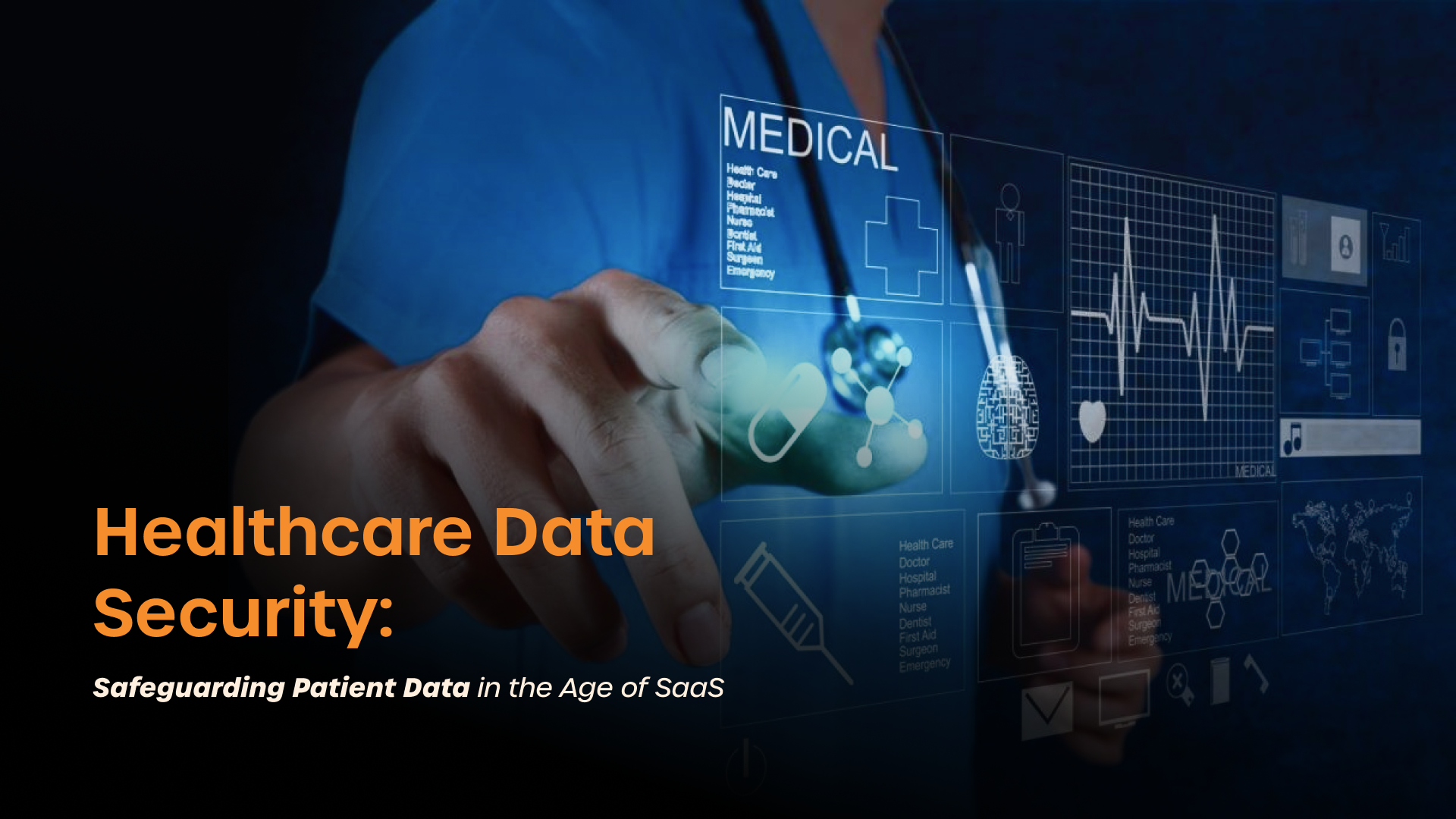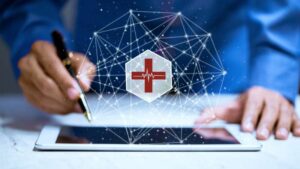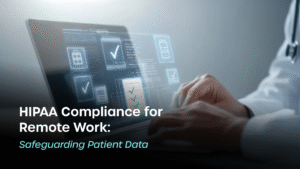Healthcare Data Security: Safeguarding Patient Data in the Age of SaaS

Summary
The surge in SaaS adoption in healthcare creates new data security challenges. RemoteDesk provides AI-powered facial authentication and employee monitoring to protect sensitive patient data, ensure compliance, and prevent unauthorized access.
Introduction: The Rise of SaaS in Healthcare Data Security
In recent years, the adoption of Software as a Service (SaaS) in the healthcare industry has surged, driven by the need for cost reduction, improved patient care, and the flexibility that SaaS applications offer. These applications have revolutionized how healthcare organizations manage their operations, from patient records to treatment plans. However, with this rapid adoption comes an increased risk to healthcare data security. Protecting sensitive patient information, such as electronically protected health information (ePHI), has become a critical concern for IT and security teams.
The Challenge: Balancing SaaS Adoption with Healthcare Data Security
Healthcare organizations deal with a vast amount of sensitive data daily, including patient records, treatment histories, and financial information. The decentralized nature of SaaS applications, coupled with the distribution of data across multiple platforms, poses significant challenges to maintaining robust data security. IT and security teams must address several fundamental questions:
- Where does the data reside? Understanding the location and processing of sensitive or personally identifiable information (PII) is crucial for maintaining control.
- Who has access to the data? Ensuring that only authorized personnel can access sensitive data is key to preventing unauthorized access and potential breaches.
- How secure is the data? Protecting data from external threats, misconfigurations, and internal misuse requires a comprehensive security strategy.
The complexity of managing data security in a SaaS-driven healthcare environment cannot be overstated. The stakes are high, as any failure to protect patient data could result in non-compliance with regulations like HIPAA and severe reputational damage.
A New Approach to Healthcare Data Security
Traditional methods of managing SaaS applications often fall short of addressing the unique challenges faced by healthcare organizations. These solutions typically focus on specific issues like SaaS misconfigurations or shadow IT, but they fail to provide a holistic view of the SaaS landscape. A more effective approach is needed—one that integrates all aspects of SaaS management to offer a single source of truth for healthcare data security.
Key Capabilities for Effective SaaS Management in Healthcare
Given the surge in SaaS adoption and the inherent risks, healthcare organizations should consider a comprehensive SaaS management strategy that includes the following key capabilities:
- Visibility Across the SaaS Ecosystem:some text
- Achieving full visibility into the entire SaaS application environment, including known, unknown, and shadow SaaS apps, is critical. Understanding where data resides and how it flows between applications ensures that healthcare providers can maintain control over sensitive information.
- Monitoring and Control:some text
- Continuous monitoring of data flows between SaaS applications in a connected healthcare environment is essential. This enables organizations to identify who has access to data and ensures that SaaS environments are properly configured and secured.
- Compliance and Risk Management:some text
- As healthcare organizations expand their SaaS usage, ensuring compliance with regulations like HIPAA, SOC-2, CIS, ISO27001, and NIST becomes increasingly complex. Effective SaaS management solutions should streamline compliance by providing insights into authentication protocols, data-centric configurations, and app-specific security measures.
How RemoteDesk Enhances Healthcare Data Security
RemoteDesk, a leader in AI-powered security solutions, is uniquely positioned to address the challenges of healthcare data security in a SaaS environment. By leveraging continuous facial scan verification and AI-driven employee activity monitoring, RemoteDesk provides an additional layer of security that complements SaaS management strategies.
With RemoteDesk, healthcare organizations can ensure that their remote workforce adheres to compliance standards without storing biometric data. This innovative approach not only enhances data security but also aligns with stringent healthcare regulations, offering peace of mind to both IT teams and patients.
Case Study: Enhancing Security with AI-Based Facial Authentication for a Renowned Healthcare Provider in the USA
A renowned healthcare provider in the USA faced significant challenges in securing access to confidential data and critical applications.
With increasing incidents of data breaches and unauthorized access, the provider sought an advanced security solution to ensure that only authorized personnel could access sensitive information.
The chosen solution was an AI-based facial authentication application “RemoteDesk”, designed to add a layer of security, detect spoofing attempts, and alert the security team in real time during facial recognition.
Problem Statement
The healthcare provider needed to address the following security concerns:
- Unauthorized access to confidential patient data.
- Spoofing attempts to bypass traditional authentication methods.
- Ensuring compliance with healthcare regulations such as HIPAA.
- Delays in detecting and responding to security breaches.
Solution Implementation
The provider implemented an AI-based facial authentication system integrated with their existing access control mechanisms.
Key features of the solution included:
- Facial Recognition: Utilized advanced computer vision AI to authenticate users based on facial features.
- Spoof Detection: Incorporated real-time detection of spoofing attempts using photos, videos, or masks.
- Real-Time Alerts: Provided immediate alerts to the security team upon detecting unauthorized access attempts.
- User Activity Monitoring: Continuously monitored user presence and activities to ensure compliance with security policies.
Benefits
The implementation of the AI-based facial authentication “RemoteDesk” resulted in several significant benefits:
- Enhanced Security: Reduced the risk of unauthorized access to confidential data.
- Operational Efficiency: Streamlined the authentication process, reducing the need for manual intervention.
- Improved Compliance: Ensured adherence to HIPAA and other healthcare regulations.
- Real-Time Threat Detection: Enabled swift response to potential security breaches.
RemoteDesk proved to be a highly effective solution for the healthcare provider, addressing critical security concerns and enhancing overall data protection.
The provider not only achieved significant improvements in security and compliance but also experienced increased operational efficiency and user satisfaction.
The Future of Healthcare Data Security: Embracing Innovation
As the healthcare industry continues to embrace digital transformation, the importance of robust data security cannot be overstated. SaaS applications offer numerous benefits, but they also introduce new risks that must be carefully managed. By adopting a comprehensive approach to SaaS management and integrating advanced security solutions like RemoteDesk, healthcare organizations can protect sensitive patient data, maintain compliance, and ensure the highest standards of care.
In conclusion, the path to securing healthcare data in a SaaS environment requires a multi-faceted strategy that combines visibility, monitoring, compliance, and innovative technologies. With the right tools and a commitment to security, healthcare providers can navigate the complexities of SaaS adoption while safeguarding the trust of their patients.
Final Thoughts: Your Next Steps
If you’re a healthcare provider looking to enhance your data security in a SaaS-driven world, now is the time to take action. Consider integrating comprehensive SaaS management solutions and leveraging tools like RemoteDesk to stay ahead of emerging threats and ensure compliance. By doing so, you can protect your patients’ most valuable asset, their data.




